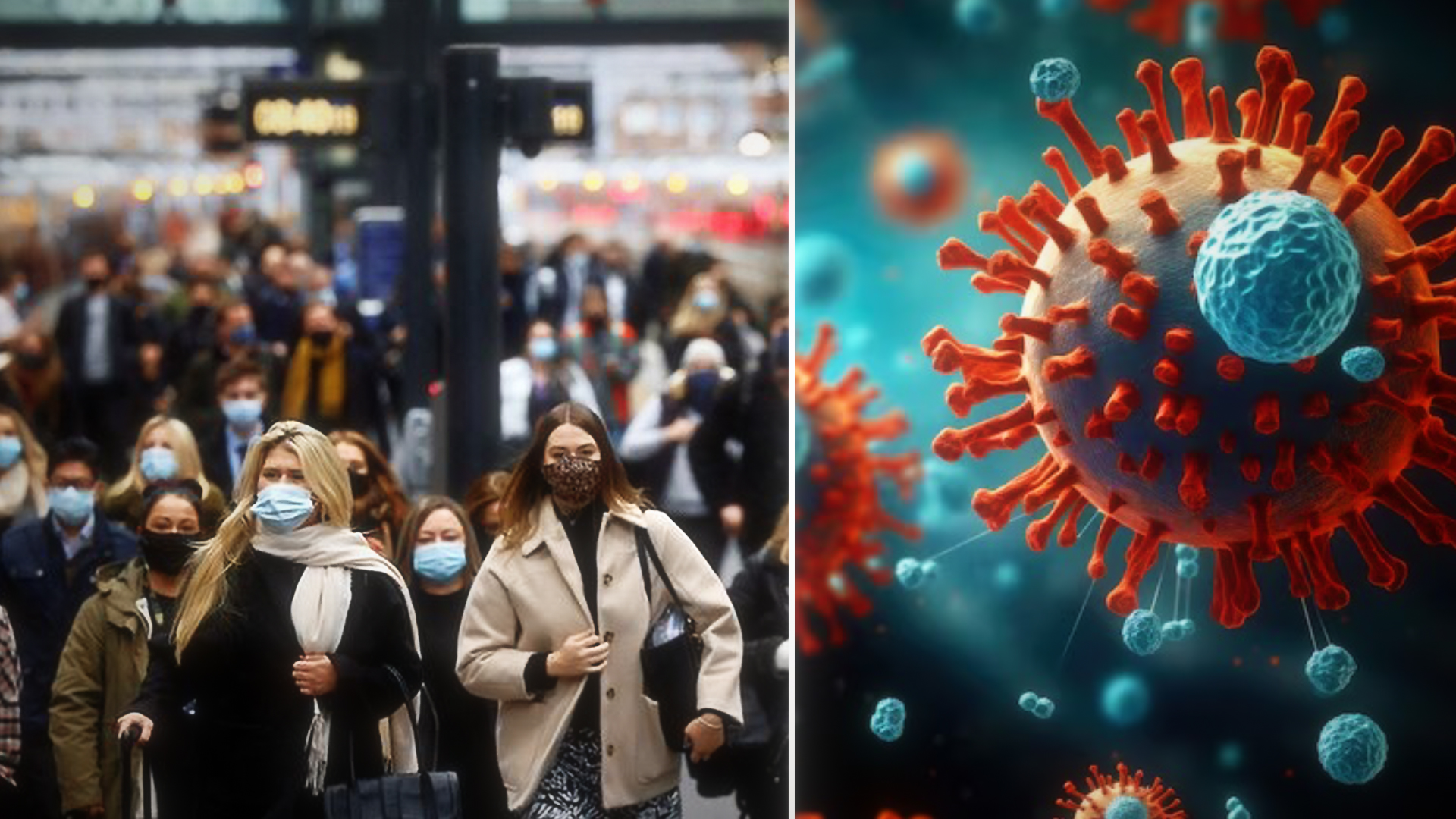The Hidden Symptoms of HMPV: A ‘Mystery’ Illness Surging in China and Already Affecting the UK

In recent weeks, a previously overlooked flu-like virus called Human Metapneumovirus (HMPV) has been gaining attention worldwide. This respiratory illness, which has caused significant disruptions in China, is now making its presence felt in the UK as well. Experts warn that the surge in HMPV cases could lead to an increase in hospitalizations and health concerns, particularly in vulnerable populations.
While the virus is not new, it has remained under the radar of many until now. However, recent outbreaks in northern China, where healthcare systems have struggled to manage the increased patient load, have raised global awareness of HMPV’s potential impact. If you haven’t heard of HMPV yet, this article will help you understand why it’s important to stay informed and how you can protect yourself.

What Is HMPV? Understanding the Virus and Its Impact
Human Metapneumovirus (HMPV) is a respiratory virus that primarily affects children, though it can infect individuals of any age. It is commonly known to cause symptoms that resemble the common cold, including:
- Coughing
- Runny nose
- Nasal congestion
- Sore throat
- Fever
Typically, these symptoms appear 5-7 days after exposure to the virus and clear up after about a week. However, for some individuals, HMPV can lead to more severe symptoms, such as:
- Bronchitis
- Bronchiolitis
- Pneumonia
In such cases, individuals may experience shortness of breath, severe coughing, and wheezing, requiring medical attention. HMPV is most concerning for the young, the elderly, and those with compromised immune systems, as it can lead to more serious respiratory issues, especially in the lower parts of the lungs.
Despite its potential to cause serious health problems, HMPV is generally considered to be a self-limiting virus in otherwise healthy individuals. However, like other respiratory viruses, it can be easily transmitted from person to person through coughs, sneezes, and airborne droplets.
Why Is HMPV a Growing Concern?
HMPV has been circulating globally since its discovery in 2001, but it hasn’t received the same level of attention as other respiratory viruses like RSV (Respiratory Syncytial Virus) or Influenza. The COVID-19 pandemic also overshadowed other viruses, but as the global situation stabilizes, attention is turning back to other viruses like HMPV.

The current surge in cases in China has amplified concerns, especially as it leads to an increase in hospitalizations and overwhelming emergency rooms. Experts are concerned about the hidden nature of the virus, which can incubate for several days before symptoms become noticeable. This gives individuals a chance to unknowingly spread the virus, which could contribute to further outbreaks, especially in areas where the virus is not yet widely known.
Social Media Reactions: Rising Concerns
On Twitter, many individuals have expressed concern about the virus’s spread, noting how similar it is to RSV, which affects infants and the elderly. Some people are also commenting on how difficult it is to differentiate between the early symptoms of HMPV and the common cold, urging others to stay cautious and consult healthcare providers if symptoms worsen.
One tweet from @GlobalHealthWatch said:
“As flu season continues, be aware of HMPV. Early symptoms can be mild, but don’t let your guard down! Stay informed and take precautions! #HMPV #HealthAlert”
HMPV in the UK: What’s Happening Now?
In the UK, HMPV cases have been increasing steadily in recent weeks, with the latest data showing a marked rise in cases compared to the same time last year. Experts have noted that HMPV has been circulating for over a decade, but this increase in cases is somewhat unusual. With COVID-19 still lingering in the background, many public health authorities are concerned that these rising numbers could signal a more widespread issue.
According to the UK Health Security Agency (UKHSA), there has been a noticeable uptick in hospital admissions due to respiratory viruses, particularly in children under the age of five. While the rise in cases should not cause widespread panic, it does indicate that HMPV may now be more prevalent than before, especially during the winter season when respiratory infections are more common.

What Are the Symptoms of HMPV?
While most people with HMPV will experience typical cold-like symptoms, others may develop more severe respiratory conditions. Here’s a breakdown of the most common and severe symptoms:
Mild Symptoms:
- Coughing (often a persistent dry cough)
- Runny nose
- Sore throat
- Mild fever
- Fatigue
These symptoms generally last for a few days and can be managed with over-the-counter cold remedies and rest. The majority of people recover without any major complications.
Severe Symptoms:
In some cases, especially in young children and those with compromised immune systems, HMPV can cause more severe respiratory issues such as:
- Shortness of breath
- Wheezing
- Severe cough (often accompanied by difficulty breathing)
- Chest pain or discomfort
- Pneumonia or bronchitis (in extreme cases)
If you or someone you know develops these more severe symptoms, it’s essential to seek medical attention immediately. In some cases, hospitalization may be required to manage symptoms and ensure proper care.
How Is HMPV Diagnosed and Treated?
Because HMPV symptoms are similar to other respiratory illnesses, such as RSV or the flu, diagnosing the virus requires specific testing. PCR (Polymerase Chain Reaction) tests are commonly used to confirm the presence of HMPV in the body, as they can accurately detect the virus even in its early stages.
Currently, there is no specific antiviral treatment for HMPV, and it is primarily managed through symptom relief. The following measures can help alleviate the symptoms of HMPV:
- Resting and staying hydrated
- Using over-the-counter pain relievers (such as acetaminophen) to manage fever
- Using a humidifier to ease congestion
- Avoiding smoking and secondhand smoke, which can worsen respiratory symptoms
If you experience more severe symptoms, such as difficulty breathing or chest pain, it is important to consult with a healthcare provider. In some cases, individuals may require oxygen therapy or other interventions to help with respiratory issues.
Prevention: How to Protect Yourself from HMPV
Just like with COVID-19, preventing the spread of HMPV involves taking simple precautions to reduce transmission. Since HMPV spreads through respiratory droplets, it is important to:
- Cover your mouth when coughing or sneezing (preferably with a tissue or elbow)
- Wash your hands frequently with soap and water, especially after coughing or sneezing
- Avoid close contact with those who are sick, particularly those who are more vulnerable, such as young children or the elderly
- Use face masks in crowded or public spaces if you are feeling unwell
Global Concerns and Social Media Views
On Reddit, people are raising concerns about whether we’re ready to face another respiratory crisis following the COVID-19 pandemic. The rise in HMPV cases in China has sparked discussions about the need for more public health education on the virus. Users are asking:
- “How can we tell the difference between HMPV and the flu? Should we be worried?”
- “What are the best ways to protect my children from this virus?”
You can join the discussion on Reddit or follow updates on Twitter and Facebook for real-time information.
Conclusion: What You Need to Know About HMPV
As HMPV cases continue to rise in both China and the UK, it’s crucial for the public to stay informed about the virus’s symptoms and how to protect themselves. Early detection and preventive measures like good hygiene and staying home when sick can help reduce the spread of the virus. If you’re concerned about HMPV, consult your healthcare provider, particularly if you or someone in your household is at higher risk of complications.
Social media discussions reflect a blend of concern and curiosity, with many people sharing tips for staying safe and asking questions about the virus’s symptoms. This year, let’s make sure to stay vigilant, informed, and safe as we navigate the flu season and the rise of HMPV.
What Are Your Thoughts? What do you think about the rise in HMPV cases? Have you experienced any symptoms or concerns? Join the conversation online and share your thoughts using the hashtag #HMPVAwareness.
Featured Image Credit: STR/AFP, Roger Harris/Science Photo Library RF, Kirsty Wigglesworth/AP






